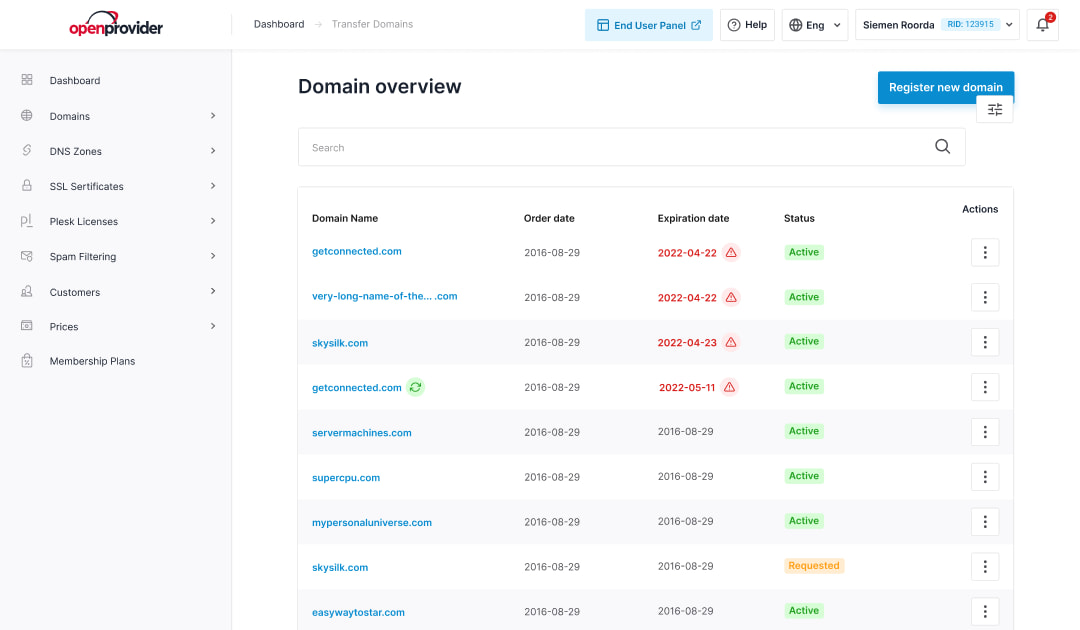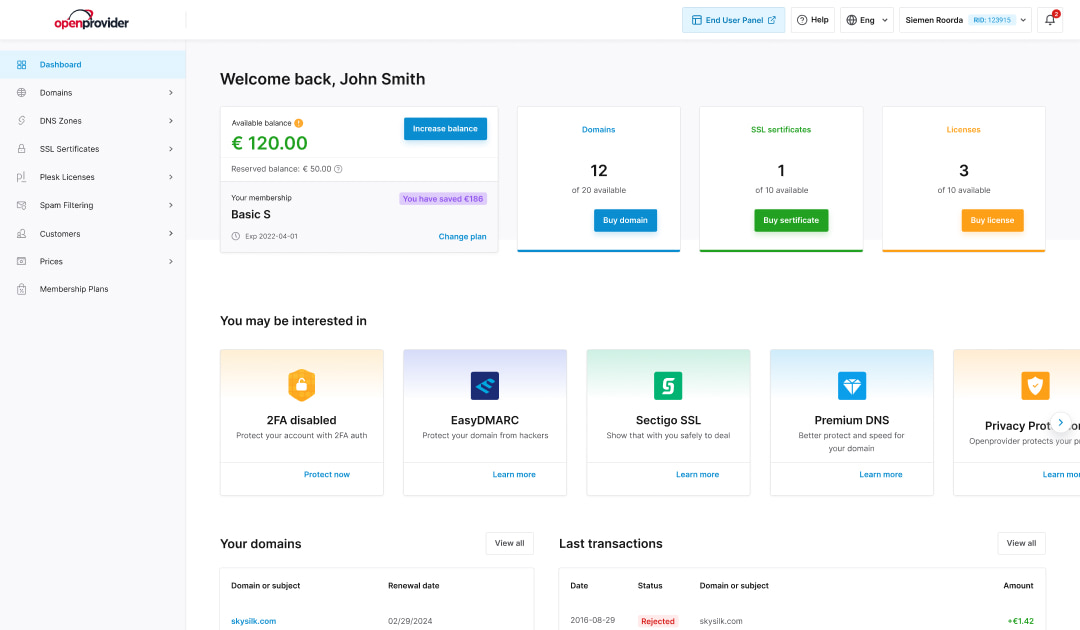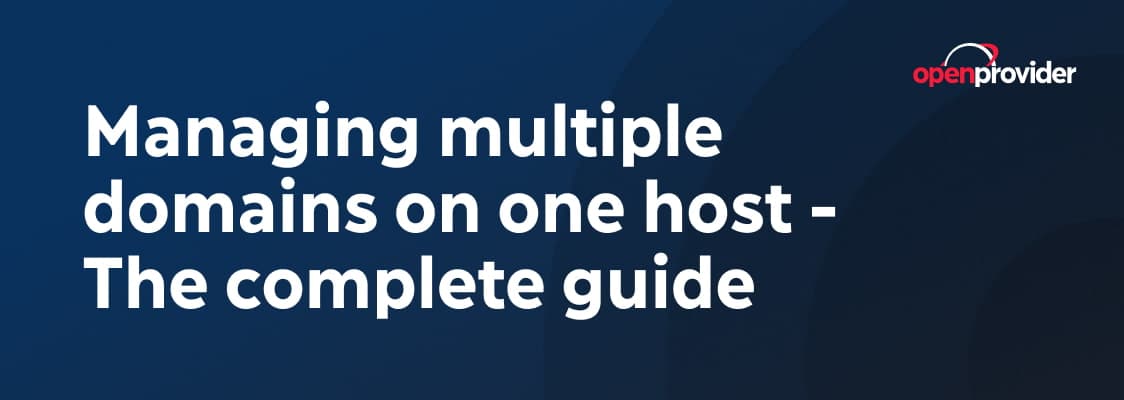Is it possible to manage multiple domains on one hosting account?
The short answer is yes.
In fact, managing multiple domains under a single hosting plan has become a common and highly efficient practice for web professionals, digital agencies, and hosting providers alike.
Centralizing access drives benefits that impact cost, control, and customer experience.
In this article, we’ll explore how multi-domain hosting works, its pros, and what to watch out for
We’ll also show you how domain managers can exploit our platform to perform all critical domain operations in bulk without sacrificing granular control.
Benefits of managing multiple domains under one host
Managing multiple domains under a single hosting account means relying on one server environment that centralizes and consolidates operations into one space.
This approach offers tighter control and simpler management across portfolios, aiming to reduce the cost of support tickets and slowdowns due to fragmented points of resolution.
For domain resellers in particular, this includes every step of the process and, often, ancillary services as well, from domain registrations to DNS settings, hosting, and security certificates.
1. Centralized control and streamlined administration
Handling all your domains from one control panel or hosting dashboard means fewer logins, fewer credentials to track, and far less time spent navigating between providers. It simplifies updates, DNS configurations, SSL renewals, and email setup.
2. Cost-efficiency and better resource allocation
Hosting multiple domains on a single account can significantly reduce infrastructure costs. Instead of purchasing individual hosting packages for each domain, you can allocate resources from one server environment across all domains.
This is particularly valuable when thinking of stretching margin ranges over tight budgets.
3. Improved scalability and portfolio management
As your domain portfolio grows, either through acquisition, client onboarding, or expansion into new markets, managing them in one place makes it easier to scale.
This way, you can deploy new websites, configure subdomains, and maintain brand consistency across properties without the complexity of fragmented hosting solutions.
4. Easier cross-selling and bundled services
For Openprovider partners, especially web hosts and digital agencies, hosting multiple domains together opens up more opportunities for cross-selling.
You can bundle hosting, domains, SSL certificates, and DNS management into one seamless offer boosting client retention and increasing average revenue per user (ARPU).

5. Unified backups, updates, and security protocols
Running multiple domains in a shared environment allows for synchronized backups and centralized security updates. This not only enhances operational safety but also reduces the risk of oversight or configuration errors that can occur when managing separate environments.
6. Simpler reporting and analytics
A unified hosting environment makes it easier to monitor resource usage, track performance, and generate client reports across domains. For agencies and resellers who value insight into usage patterns and cost tracking, this consolidation is key to optimizing service delivery.
7. Better integration with Openprovider’s API and control panel
When you host multiple domains under one account and pair it with Openprovider’s Reseller Control Panel (RCP) or API, you unlock automation opportunities like bulk actions, instant provisioning, domain status monitoring, and centralized billing. This is a critical asset for scaling operations while keeping support tickets and manual intervention to a minimum.
Challenges of managing multiple domains (and how to overcome them)
While hosting multiple domains under one account offers clear benefits, it also introduces complexity.
The more domains you manage, the more room there is for errors, inconsistencies, and administrative overload, especially without the right processes and tools in place. For domain resellers, web hosters, and digital agencies, identifying and addressing these challenges early is critical to maintaining performance and trust with end clients.
Here are the most common challenges of managing multiple domains under one host and how to overcome them:
1. Configuration overload and human error
Each domain requires its own DNS settings, SSL certificate, email routing, and hosting configuration. When managing dozens or hundreds of domains manually, even small errors like incorrect DNS records or expired certificates can cause site outages or client dissatisfaction.
How to overcome it:
Use automation wherever possible. Openprovider’s Reseller Control Panel (RCP) and API make it easy to apply bulk actions, automate renewals, and set default configurations for new domains. Templates and provisioning rules can reduce repetitive work and human mistakes.

2. Difficulty in tracking expirations and renewals
As portfolios grow, keeping track of registration and renewal dates becomes more difficult. Missing a renewal, especially for a high-traffic domain, can lead to downtime, loss of business, or expensive redemption fees.
How to overcome it:
Leverage Openprovider’s automated renewal tools and expiry notifications, available via both the platform and API.
Group domains by client or business priority, and ensure each has an active renewal policy aligned with your business model. Membership plans also offer cost-price renewals, reducing overhead while simplifying renewals across the board.
3. Security vulnerabilities and inconsistent updates
A centralized hosting environment can become a single point of failure if not properly secured. Outdated CMS versions, weak passwords, or missed SSL renewals across multiple sites can expose your clients to risk.
How to overcome it:
Implement centralized security policies, enforce 2FA (two-factor authentication) for account access, and use automated patch management and SSL monitoring.
Good to know: Openprovider offers integrated SSL solutions that can be deployed in bulk, keeping your hosted domains compliant and protected.
4. Performance bottlenecks on shared resources
Hosting too many domains on a single plan may strain server resources, affecting load times and uptime. One misconfigured or high-traffic domain can degrade performance across others on the same account.
How to overcome it:
Monitor resource usage regularly and upgrade your hosting plan as needed. Segment mission-critical or high-traffic sites into their own containers or virtual environments.
Many resellers use VPS or cloud hosting to isolate performance-sensitive domains while maintaining central management.
5. Client management complexity
Agencies and resellers often serve multiple clients, each with unique preferences, permissions, and billing arrangements. Without structured systems, client data and access rights can become difficult to manage.
How to overcome it:
Use Openprovider platform to create segmented customer views and integrate role-based permissions. This keeps your internal operations clean while allowing for delegated access, better billing transparency, and simplified reporting.
6. Fragmented visibility and lack of portfolio insights
When domains are hosted across multiple systems or providers, it becomes nearly impossible to gain a unified view of your full portfolio. This fragmentation makes reporting, analytics, and strategic decisions harder.
How to overcome it:
By consolidating domains within Openprovider and using centralized hosting, resellers gain access to complete visibility over domain status, history, usage, and costs.
The Reseller Control Panel and API enable custom reporting that supports better business intelligence and decision-making.
How to manage multiple domains without blocks – Openprovider guide
Managing multiple domains is only as efficient as the tools and systems you rely on.
At Openprovider, we’ve built our entire platform around the needs of domain resellers, digital agencies, and web hosts who operate at scale and value simplicity, automation, and cost-efficiency.
Here’s how:
1. Easy account setup and flexible access options
Getting started with Openprovider is straightforward. You can create a free account through our Reseller Control Panel (RCP), gaining instant access to a professional-grade platform for managing domains, DNS, SSL certificates, and more.
For customers who want to unlock cost-price domains, dedicated support, and marketing tools, our membership plans offer even greater flexibility and savings.
Memberships are ideal for businesses that expect to manage a growing domain portfolio: the bigger the domain volume under management, the greater the ROI.
All memberships include full RCP access.
2. Powerful Reseller Control Panel (RCP) for multi-domain operations
The RCP is the hub of domain activity for Openprovider users. It’s designed to support both everyday users and advanced resellers with hundreds or thousands of domains. Key features include:
- Bulk domain registration: register multiple domains in one go across different TLDs.
- Easy renewals and expirations: view and manage domain lifecycle statuses, set auto-renewal rules, and receive alerts on pending actions.
- Domain transfers: initiate and track multiple domain transfers through a clean and structured interface. Transfer statuses are updated in real time.
- DNS management: configure, edit, or clone DNS zones across domains. Templates can be used to save time for frequently used records.
- Pro tip: looking for more speed, protection, and uptime? Discover our Premium DNS
- SSL management: order and renew SSL certificates for multiple domains through the same panel. All major providers and validation types are supported.
- Pro tip: looking for legacy-grade protection and higher reselling profits? Check our Premium SSL
- WHOIS and contact updates: make changes to contact data across multiple domains without manual repetition.
- Labeling and search filters: categorize domains with tags, client names, or internal projects, then search or filter accordingly.
The platform is fully responsive and supports mobile devices, allowing you to manage domains on the go.
3. Bulk actions to scale without bottlenecks
Openprovider understands that growth brings scale, and scale demands automation.
That’s why we offer an entire suite of bulk tools, accessible both via the RCP and API, to simplify high-volume operations:
- Bulk transfers: transfer hundreds of domains from other registrars using a CSV upload or API call. Our assisted migration support can help streamline the process for large portfolios.
- Bulk updates: apply nameserver changes, DNS record updates, or contact modifications across domain groups in just a few clicks.
- Bulk renewals: set global renewal preferences or selectively renew groups of domains based on tags, TLD, or expiration window.
- Bulk locking/unlocking: manage security settings across domains to prevent unauthorized changes or enable transfers.
- Bulk SSL installations: automate ordering and assigning SSL certificates to multiple domains using our integrated marketplace and management tools.
Do you have questions? Check this guide on bulk operations
4. Automation via Openprovider’s API
For advanced users and resellers with custom portals, the Openprovider API allows full integration of our services into your own systems. Automate provisioning, manage domain operations programmatically, and control your full inventory with real-time syncing.
- REST API (recommended): Modern, JSON-based API built for scale and speed.
- XML API (legacy): still used by many resellers, particularly for WHMCS and Blesta integrations.
- Weekly active API users: 700+ resellers rely on our API for automated workflows.
You can use the API for bulk domain registration, checking availability, managing DNS templates, updating contacts, renewing domains, or triggering automated reporting.
5. Centralized billing and unified portfolio view
With Openprovider, all your transactions, registrations, renewals, and service purchases run from a single prepaid balance.
This means:
- No per-transaction charges
- One invoice per billing period
- Complete portfolio reporting and cost tracking
- Real-time balance monitoring from the RCP dashboard
This financial structure simplifies operations and avoids the reconciliation headaches that come with using multiple registrars or fragmented billing systems.
6. Tiered membership support and reseller resources
Advanced membership plans benefit from maximum ROI over their resales, while all members, including basic members, get:
- Access to our MDF (market development fund) programs
- Invitations to exclusive webinars and workshops
- Co-branded marketing materials
- Assisted with onboarding for large migrations
- Dedicated account management for high-volume customers
Conclusion
Managing multiple domains under one hosting account means smart business for domain resellers, digital agencies, and IT professionals looking to grow efficiently.
By centralizing domain operations, you reduce complexity, cut costs, and gain better control over your entire portfolio. But the real value lies in how effectively you manage that setup.Simplify multi-domain hosting today: start immediately using our free RCP or join a Membership plan for cost-price benefits and premium tools.




